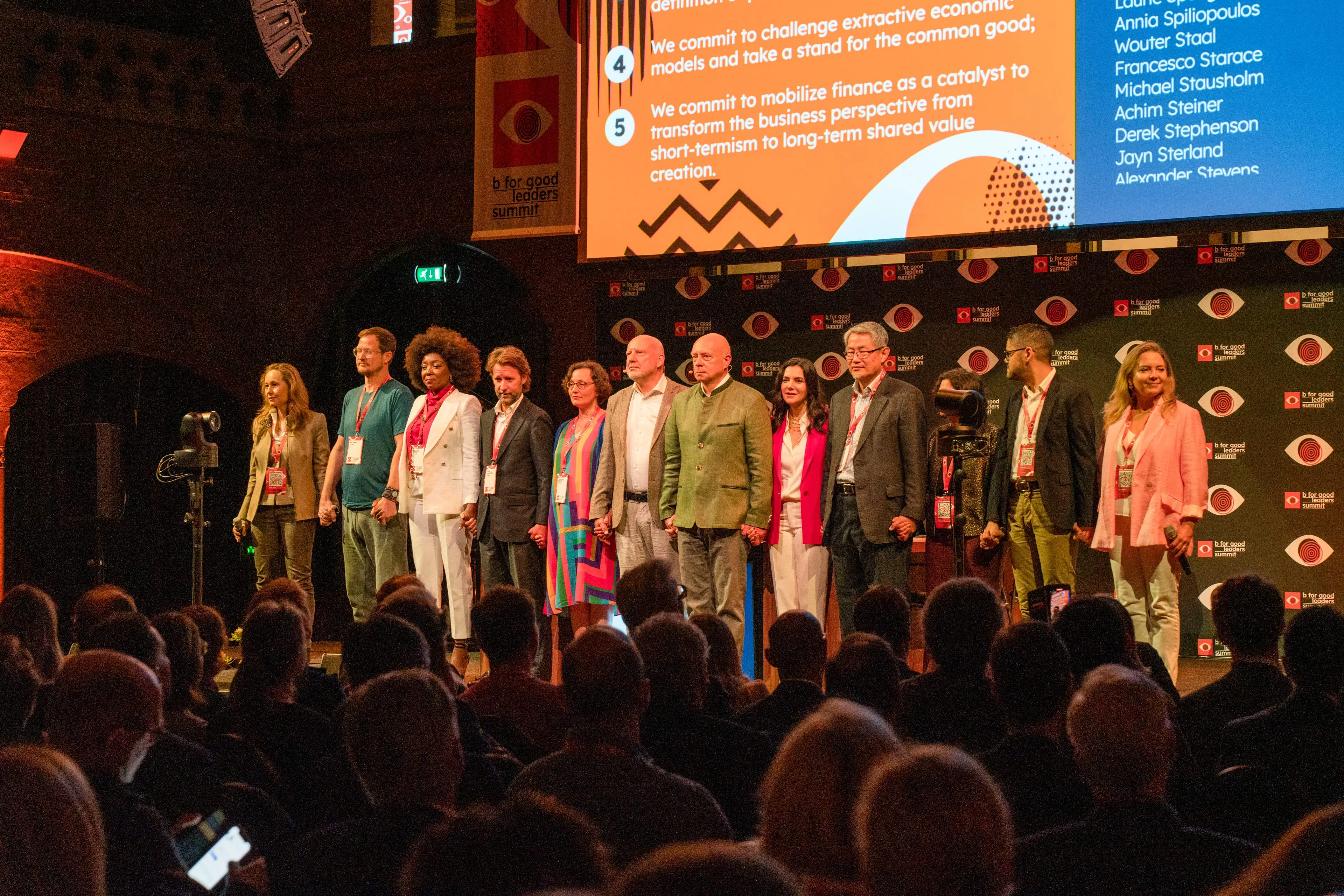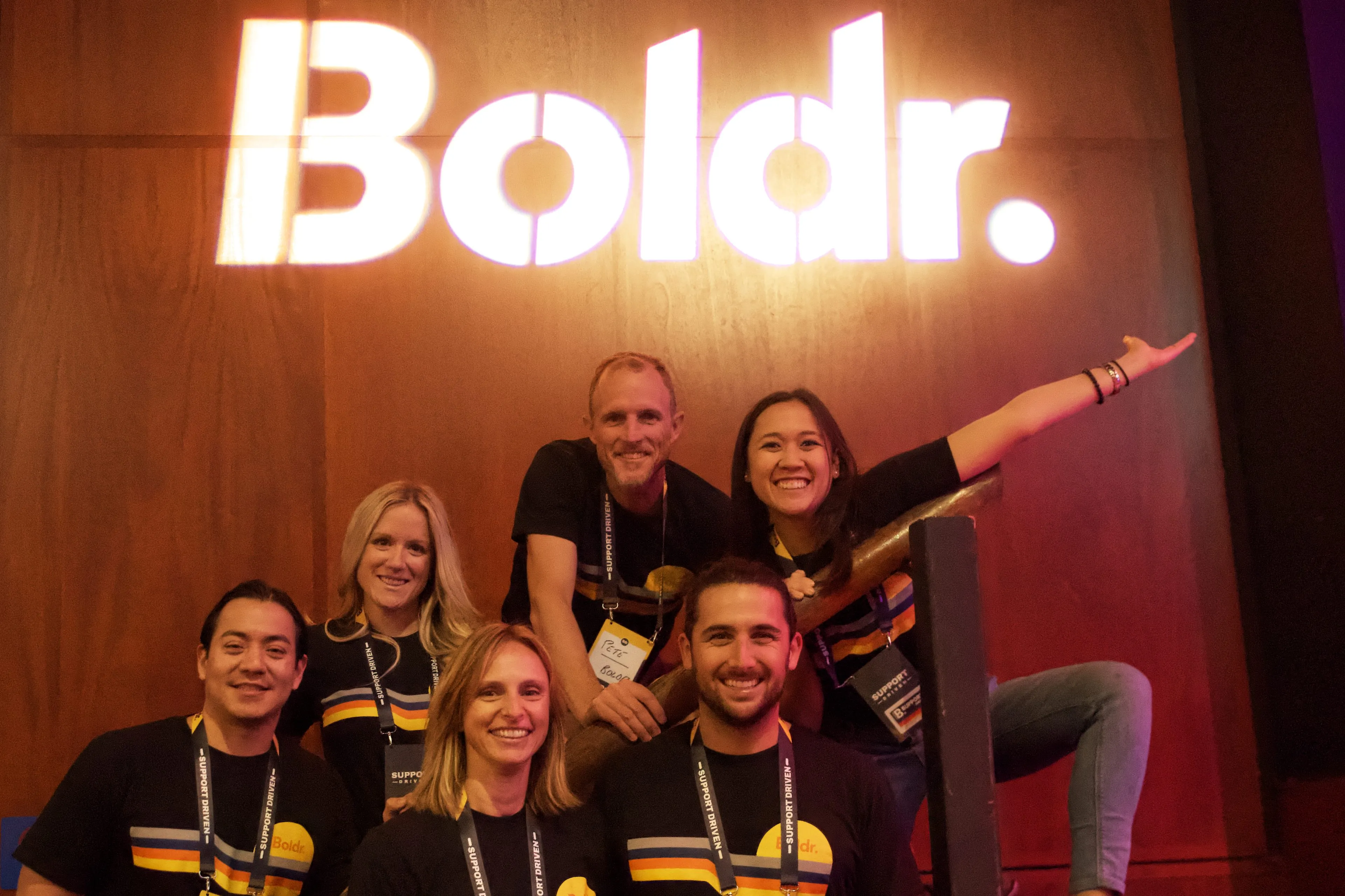Ethical Outsourcing and a Regenerative Economy: Insights from the B for Good Leaders Summit
“Everything we do is underpinned by two simple questions: is this right by the environment and is this right by the people”
– Evelyn Doyle, Head of People and Culture at Patagonia
The B for Good Leaders Summit held in Amsterdam was a transformative experience. The summit convened over 1,200 visionary and purpose-driven leaders from across and beyond Europe, all committed to driving positive and regenerative change in their respective industries. From large multinational companies such as Patagonia, Unilever, Danone, to newly established family-owned businesses, the impetus and mission was the same: to accelerate businesses as a force for good in the world.
1,200 may feel like a drop in the bucket of global capitalism and in the grand scheme of the business world. Yet I realized that each leader present represented thousands of people, families, ecologies, and communities whose survival is heavily influenced by the business decisions they make every day. For instance, Danone, one of the largest B Corp Certified food manufacturers has over 100,000 workers across 57 countries. Unilever, whose local subsidiaries are B Corp certified have over 138,000 workers and employees. These are only two examples of leaders with massive global supply and value chains. Everyone understood their responsibility to every individual within and even beyond the remit of their company, especially those in the farthest ends of the supply chain and whose families, children, and environments ought to be equal stakeholders of their businesses.
While the future we aspire for is that all businesses become regenerative and transformative, the summit made it abundantly clear that there are concrete actions that businesses have taken and can take today that will set the foundation for a better future for all people and our planet. In our case, the business decisions we make for our team members ostensibly ripple into the lives of families across the Philippines, Mexico, South Africa and Canada. The outcome of these business decisions are proof of whether there was real societal or regenerative value created.
The nature of most businesses that tackle regeneration and regenerative practices tend to lean towards their negative impact on nature and the environment. However, the University of Oxford defines a “Regenerative Economy” or model to be one that simply “moves away from extractive business models” and instead “unlocks the potential for positive contributions for nature and society”. In the context of labor value chains or outsourcing, regeneration means empowering families to be able to live their best lives without being encumbered by a hyper-dependence on labor for survival.
Title image source: B for Good Leaders Official Photo Bank. Photo by: Leandro Bistolfi
Purpose transcends intentions when coupled with action
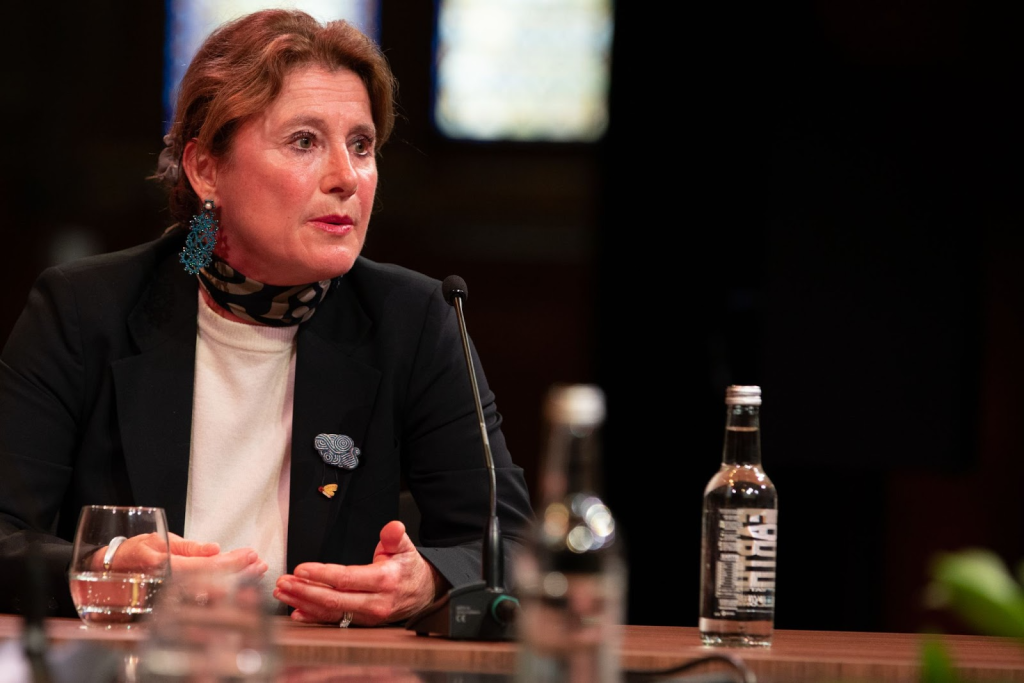
Source: B for Good Leaders Official Photo Bank. Photo by: Leandro Bistolfi
“What was your tipping point to turn your purpose into action? When we see things are broken, we approach solving this one thing at a time. Everyone in this room has means and the influence to make a difference.” Corinne Vigreux, Co-founder, and CMO at TomTom, and Founder at Codam College
This question was posed as a challenge to all the leaders at the summit. Vigreux emphasized the importance of doing what is right, treating people, suppliers, and customers with respect. Her words serve as a reminder that purpose must be coupled with action that is replicable and scalable. Purpose is not a flash in the pan, but rather it is a consistent set of business decisions that materially improve the lives of people or the environment. In Corinne’s example, she saw the immense potential of technology as an enabler for social mobility, particularly for young people. The problem she saw was that access to coding education was not always accessible. This was the societal gap she solved by establishing Codam College, which is designed to empower the next generation of coders. Codam College does not charge any tuition fees or require any prior experience or diplomas for anyone interested to learn and start a career in coding. Corinne’s dual role as both the CMO and Co-Founder of TomTom, a highly successful mobility company, while also realizing her passion through Codam College which democratizes coding education, is a unique example of purpose in action.
Authentic leadership is the courage to do the right thing
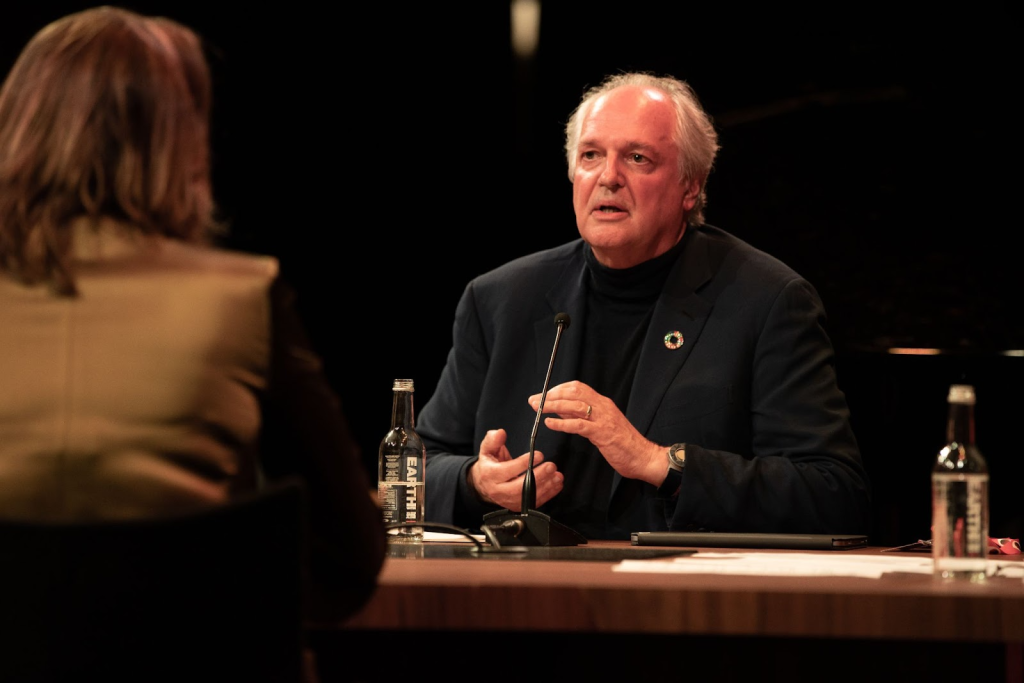
Source: B for Good Leaders Official Photo Bank. Photo by: Leandro Bistolfi
“Authentic leadership takes courage and it comes from a stronger sense of purpose. However, I believe it actually takes more courage to deliberately do the wrong thing, especially if you know it is wrong. This is a different and a sad form of courage. It takes more courage because you have to live your whole life knowing you are doing the wrong thing.” – Paul Polman, Founder at Net Positive and Co-Founder at Imagine
Authentic leadership in the context of a regenerative businesses was summarized into one question by the majority of the speakers: “As a CEO and a leadership of a company that employs thousands of people, who have families of their own, can I go home every day to my own loved ones (especially my children), look them in the eye and truthfully say that I made decisions today that creates a better world for them tomorrow?”. Authentic leadership was also characterized by the decisions not to betray one’s humanity by harming other human beings for personal gain.
Paul Polman emphasized the fact that business leaders daily face difficult decisions. He suggested that, while making the right decisions are often more difficult, it does take more courage to live with the conscience and potentially the consequences of doing the wrong thing, making the unethical business decisions, reducing humanity as a means to an end. Real authentic leadership is seen in the courage to make the short term difficult decisions because it honors the welfare and dignity of all stakeholders for posterity and these leaders are known to leave an authentic legacy that surpasses their commercial success.
Regenerative companies go against the grain of traditional businesses
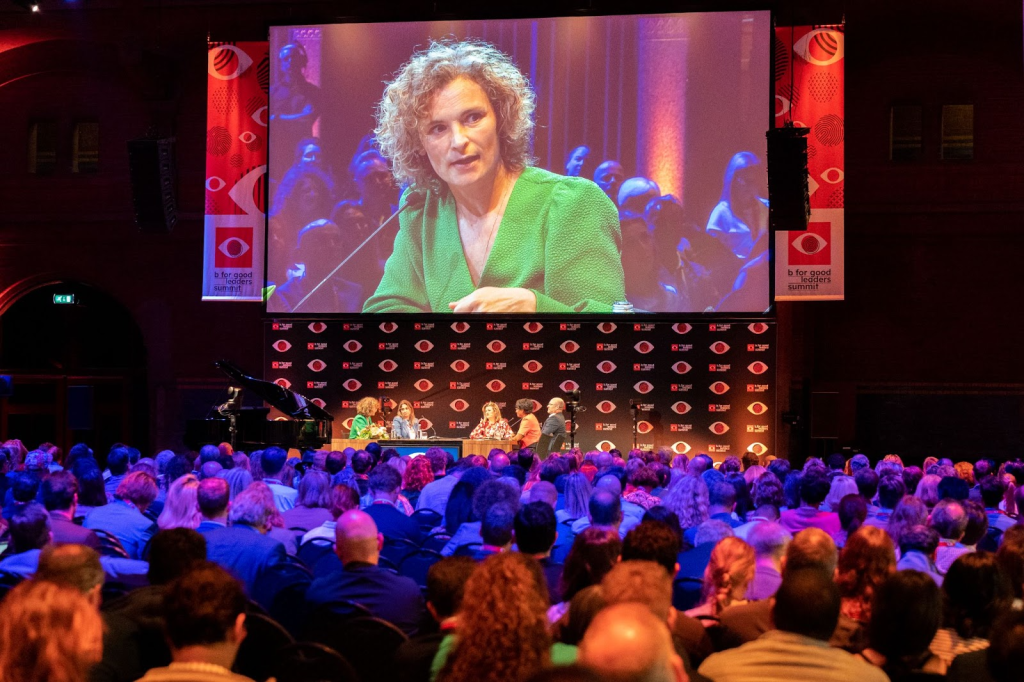
Source: B for Good Leaders Official Photo Bank. Photo by: Leandro Bistolfi
I demonstrate [through my company] that businesses can be both ethical and commercially successful – Eva Gouwens, CEO at Fairphone
Eva Gouwens, the CEO at Fairphone, a company known for its commitment to sustainable and ethical electronics, shared how they carefully consider all areas of their supply chain. Eva argues that this is particularly because the business of consumer electronics has historically been rife with problematic sourcing and labor practices. She challenges this model by ensuring materials for Fairphone’s gadgets are either recycled or sourced ethically, that all workers are paid a living wage, and that phones are built to last up to five years.
In an article by Forbes about “How Fairphone Beats Apple, Samsung And The Rest With The ‘World’s Most Sustainable’ Phone”, the author writes that “Fairphone beats its competitors through sustainability and ethics”. By building phones in a modular way that makes repair and replacement easier, the phone lasts longer, thus reducing its e-waste footprint. Fairphone is the first phone manufacturer using Fairtrade certified gold because of how the company honors and protects the rights, wages, and working conditions of their workers in their factories. These practices make the company worthy of its recognition as “the most sustainable and ethical phone manufacturer on the planet”.
Final Thoughts

Source: B for Good Leaders Official Photo Bank. Photo by: Leandro Bistolfi
“You [businesses] cannot outsource your value chain and outsource your responsibility to society in the process” – Paul Polman, Founder at Net Positive and Co-Founder at Imagine
Witnessing all of these commitments unfold from my standpoint and as part of a company that is functionally part of many of our clients’ value chains, the proximity to people as our main stakeholders became even clearer. There is a temptation to perceive the role of headquarters, corporations, and parent companies as distant from what happens on the ground. But in reality, the corporate headquarters are the ones held the most accountable for all the problematic and unethical practices that take place in the supply chain. Hence, Paul Polman’s quote on how businesses CANNOT outsource their responsibility to their supply chain and to society by extension resonated the most.
Delivering on our commitment towards “ethical outsourcing” shows that even companies embedded in the value chain can make a conscious decision to operate regeneratively. Boldr’s role in the global value chain is to bridge opportunity and people. What this means from an ethical and regenerative standpoint is choosing the opportunities that are mutually beneficial to clients and which success does not come at the expense of people.
Additionally, ethical outsourcing acknowledges the dignity of people and what they deserve to earn to live decent and fulfilling lives for themselves and their families. Finally, another critical facet of ethical outsourcing that arguably makes it regenerative is how these opportunities contribute to a person’s personal and professional mobility. Investing in people’s potential to self-actualize beyond their output creates a work context that is regenerative as opposed to extractive.
The B for Good Leaders Summit was a glimpse into the transformative power that businesses have in the world when they choose to prioritize ethics, sustainability, and stakeholder well-being. By taking action today, embodying authentic leadership, and choosing to do business differently, a regenerative future can be achieved within our lifetime and beyond.
Glo Guevarra is the Impact Manager at Boldr and she holds a postgraduate degree in Labor, Activism, and Development at SOAS University of London.
